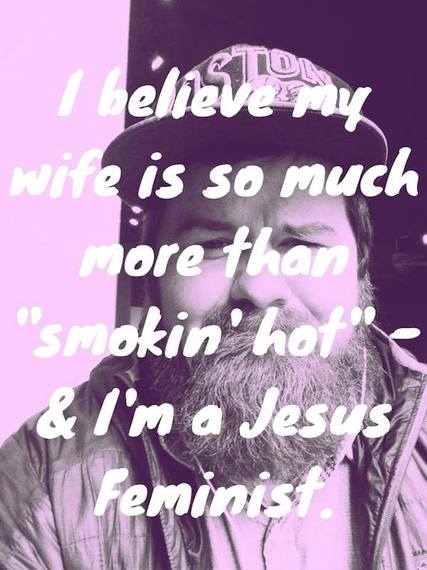Before this faithfulness arrived, we were kept under guard by the law, in close confinement until the coming faithfulness should be revealed. Thus the law was like a babysitter for us, looking after us until the coming of the Messiah, so that we might be given covenant membership on the basis of faithfulness. But now that faithfulness has come, we are no longer under the rule of the babysitter. For you are all children of God, through faith, in the Messiah, Jesus. You see, every one of you who has been baptized into the Messiah has put on the Messiah. There is no longer Jew or Greek; there is no longer slave or free; there is no "male and female"; you are all one in the Messiah, Jesus. And, if you belong to the Messiah, you are Abraham's family. You stand to inherit the promise.
This famous bit from Galatians 3 (translated wonderfully by N.T. Wright and his Kingdom New Testament) is the reason I'm a Jesus Feminist.
And that may strike some feminist ears as odd, because the apostle Paul has long been the bane of many an equality activist's existence. From wives submitting to husbands, to women being silent in the church, this apostle is the go-to guy for reinforcing complementarian and even patriarchal or misogynistic culture in the church. So how does the passage above enter into the whole of Paul's thought, and why on earth would anyone trust him with such seemingly contradictory messages credited to his pen?
When Wright translates Galatians 3, he homes in on a remarkable truth: that the gospel is all about covenant membership. In other words, as much as the gospel is telling us some cosmic good news about the ultimate salvation of the world, it is doing so in the context of a historic and here-and-now kind of covenant relationship. Really, the good news has to do with how we become members of a new covenant community, in promised relationship with God and each other. A community that shares in the future of God's ultimate salvation, and experiences that future in parts and stages and waves even now.
As such, Paul is both a man in history and a man from the future. And we see both elements in his writing and thought. The history matters -- the circumstances and reasons behind things like "submit" and "be silent" -- and so does the future -- "there is no 'male and female'; you are all one in the Messiah, Jesus." That future is nothing less than a statement of feminism -- that "women are people too" and, even more so, full covenant members of the historic family of Abraham and future inheritors of the cosmic promise of salvation. It is a super-equality, really -- an ascribing of eschataological identity to all members of the covenant.
And even in Paul's own narrative, his own life and times, the future feminism was already breaking in, as his own ministry coworkers included women (one of them an apostle).
Of course, I am most likely echoing so much of what Sarah Bessey writes about in her wonderful book, Jesus Feminist. People like Sarah have been influential in bringing me out of the old promised land of flat "biblical" gender roles and into the future of God's new egalitarian world breaking forth right in the midst of this one. There was a day when I would try to compete with all the Christian culture bros going on and on about their smokin' hot wives and casting concrete visions of true manhood -- and creating a demeaning church culture in the process. But not anymore.
Now, I want to stand as a man -- and a husband -- from the future, seeing and affirming all women, and especially my own wife, in their full humanity, dignity, spiritual gifting, and eschatalogical (that's right) identity.
I want to be a Jesus Feminist.
Just like the apostle Paul.

